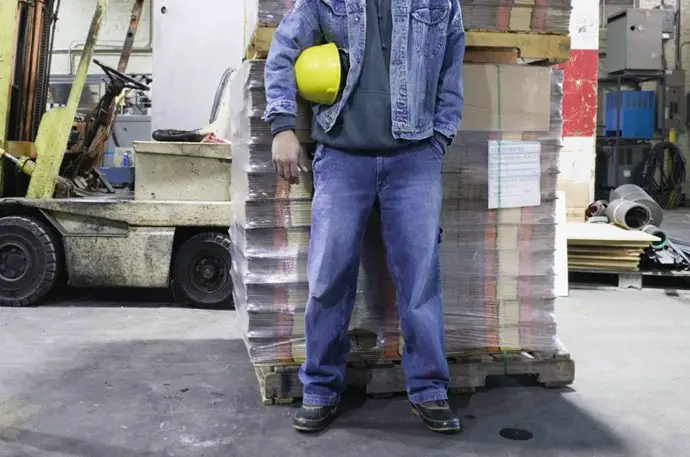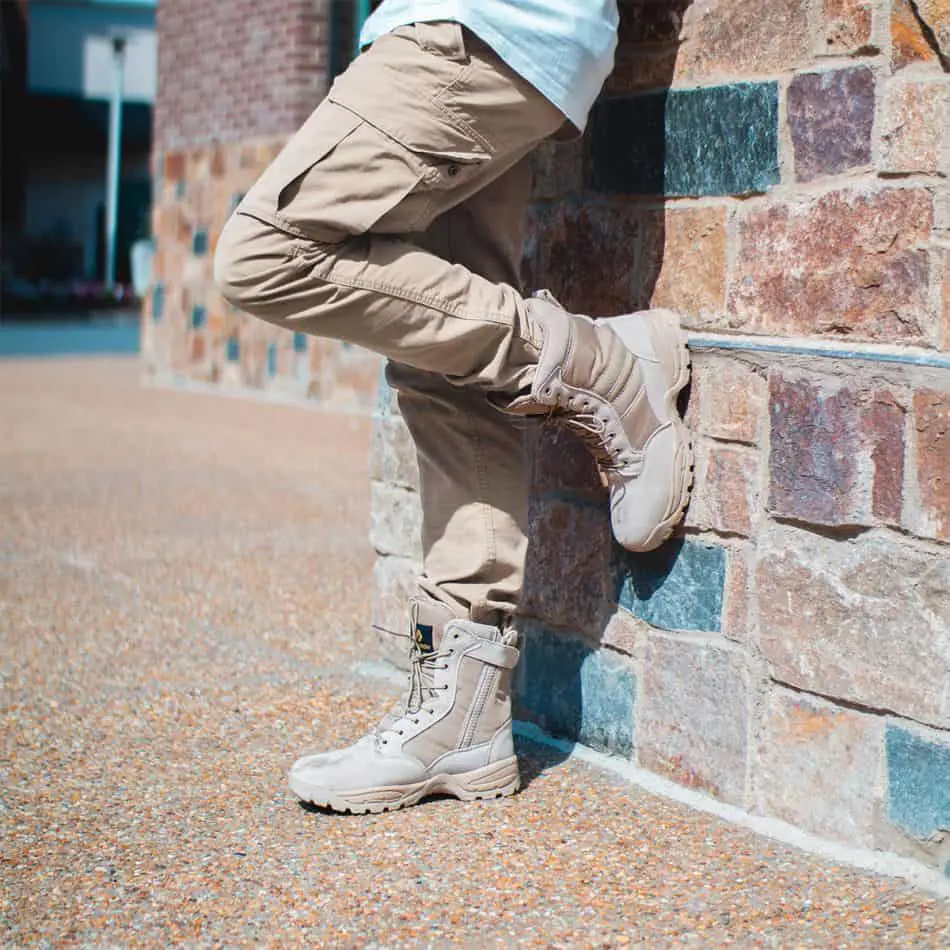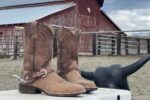Logger boots, as the name suggests, are worn by workers in the logging business. They may, however, be utilised in a variety of sectors because of their robust nature, strong outsoles, breathability, and waterproof properties.
The goal of logger boots is to offer the support and stability required for work or other activities. They are a fantastic choice when you need a sturdy work boot that can assist you get up and down a mountain or keep you on your feet and working all day without pain or discomfort.
While logger boots do come with some great features as they provide workers with the assurance that their feet will not be harmed on the job, the difficulty here is that they increase weight and rigidity.
And carrying around all that weight while walking or standing for long hours will be difficult. I mean, if your profession needs you to walk all day on flat concrete floors, then logger boots might not be such a good idea.

Nonetheless, it comes with various features like:
-
-
- Waterproof leather of superior quality
- Tough lug patterns on the outsoles
- Safety toes
- Raised heels
- Waterproof
- Shanks
-
Although logger boots may be used as construction boots and are necessary for specific operations, there are generally better choices of work boots for concrete work. It is critical to match a boot to the unique requirements of your profession.
Why makes logger boots ideal for concrete?
As mentioned above, logger boots aren’t ideal for standing or walking for long hours as they might get uncomfortable and heavy to work with. However, there are various features that might be useful while working in concrete. Let us find out what:
→ Because logger boots are waterproof, you won’t have to worry about your feet being soggy and wet.
→ If working on concrete necessitates a lot of climbing, logger boots will save you from tripping back.
→ The logger boots save you from stumbling since they have slip-resistant soles that keep you from falling.
→ The elevated heels protect you from falling when walking on slick surfaces while still keeping your feet comfortable.
→ Logger boots have thick, well-padded insoles that absorb a lot of the pressure from beneath your feet, preventing them from hurting.
→ If you can get breathable logger boots, your feet will be more comfortable because the sweat will be drained away keeping your feet cool and dry.
And now, let’s find out the reason why logger boots will hamper your work in concrete.
Why are logger boots not suitable for standing on concrete?
While concrete is a flexible and durable material, it is not the ideal surface to walk on all day. It’s tough and harsh on the body. Concrete, unlike carpet or wood, does not absorb stress. Your feet, legs, and joints will feel every movement you make.
Workers who have been exposed to concrete for an extended period of time are more likely to have long-term health problems. It can result in permanent joint problems, back discomfort, poor posture, and other issues.
While you may not be able to avoid concrete surfaces entirely, there are some things you can do to keep your feet safe and pleasant. A good pair of work boots may make all the difference.
Logger boots have tough, heavy-duty outsoles since they are intended for use in harsh outdoor situations with uneven terrain, which is prevalent in the logging industry. As a result, while they are long-lasting and trustworthy, they are not suitable for all jobs.
You don’t need an ultra-rugged boot if you’re going to be standing on a smooth surface or concrete all day. A person wearing logger boots on a manufacturing floor is trading comfort for a tough build that the work does not need.
It is essential to match a boot to your profession so that you have something that operates and keeps you safe while also being as comfy as possible.
When are logger boots ideal for concrete work?
Logger boots are only appropriate for concrete if the work requires:
-
-
- Work exposed to the harsh environmental elements.
- For most of the day, you will be walking on uneven concrete surfaces.
- Work that requires climbing up or down the ladder or uneven, slippery stairs.
- Some construction sites with muck, mud, and uneven terrain may require a rough lug design to aid grip and stability.
-
If you usually operate on a smooth surface or concrete, consider using a wedge outsole to give additional comfort to your feet.
The downside is that the wedge soles lack aggressive lug patterns and so do not give enough grip on rough ground. You must make a decision depending on your specific employment requirements.
If you require a higher heel and robust sturdiness for your construction task, a logger boot is definitely the best choice. You could go for this boot:
Thorogood Logger Boot with Safety Toe- Long days and difficult working circumstances are not a problem anymore with these loggers. The slip-resistant and abrasion-resistant vibram outsole will give you enough traction against any uncertain surfaces.
Check it out here-
- Vibram Rubber Midsole
- Removable, Ultra Shock Absorption Footbed
- Steel Shank
- Waterproof Membrane with Aztec Lining
- Vibram Outsole with Re-Inforced Tip Stitch
- Storm Welt Construction
Prices pulled from the Amazon Product Advertising API on:
Product prices and availability are accurate as of the date/time indicated and are subject to change. Any price and availability information displayed on [relevant Amazon Site(s), as applicable] at the time of purchase will apply to the purchase of this product.
Chippewa Steel Toe Logger Boot- If you need both comfortable and safe, protective footwear, these boots will most likely check the box. The waterproof leather construction keeps you dry and protected, while the deeply treaded rubber outsole provides great grip and durability.
Check it out here-
- Goodyear leather welt construction
- Chip- A- Tex waterproof bootie
- Ruby Dri Lex 2000 lining
- ATSM Electrical Haz
Prices pulled from the Amazon Product Advertising API on:
Product prices and availability are accurate as of the date/time indicated and are subject to change. Any price and availability information displayed on [relevant Amazon Site(s), as applicable] at the time of purchase will apply to the purchase of this product.
So what are the features you should look for in a pair of work boot while standing or working on concrete:
To avoid all of the issues that come with walking on concrete all day, you should invest in a good pair of work boots that give you the necessary support.
There are several aspects to keep an eye out for:
1.) Slip Resistant features
Concrete has a smooth surface. It can be unsafe to walk on when wet, depending on the amount of gloss and grit. Purchase boots with slip-resistant features to keep yourself safe.
The lugs on these boots divert water away from sensitive pressure spots on your foot. They keep water from accumulating beneath the sole, ensuring that you are always in contact with the ground.
2.) A good quality, thick sole
Your boots’ soles act as a barrier between your feet and the concrete. A thick sole will keep you off the concrete and act as an excellent shock absorber.
A thicker sole will absorb and distribute stress more effectively. This will keep it from moving up your feet. Furthermore, thicker soles tend to last longer. On concrete, your boots will get a lot of wear and tear.
3.) Comfortable fit
Wearing an ill-fitting boot is the worst thing you can do to your feet. To utilize the full benefits of your boots, they must be well-fitting.
Before purchasing a pair of boots, take accurate measurements of your feet and select an option that allows you to achieve a snug fit.
4.) Safety toe
Working on concrete means you will be working in an environment that is full of possible dangers. This is why wearing safety gear is critical.
Work boots with the proper toe protection material are essential. ASTM (American Society for Testing and Materials) rated toe protection fittings should be used for better protection.
If you spend the most of your day on flat surfaces, it could be worth trying something a little more comfortable than a logger boot.
Timberland Soft Toe Work Boot- These boots have a classic design with a higher heel, although not as high as logger boots.
They appear like typical work boots and might serve as a good substitute if you require a higher heel but don’t want to wear logger boots.
Check it out here-
- KEEP IT COMFORTABLE: Our Timberland PRO Pit Boss soft toe is what a durable work boot should be: Safe, tough & comfortable. These leather work boots meet ANSI safety standards & feature slip-, oil- & abrasion resistant outsoles for increased traction.
- SAFETY AND COMFORT: PRO 24/7 Comfort Suspension technology is a unique comfort system that meets the most rigorous work site demands -- 24 hours a day, 7 days a week. It helps reduce foot fatigue, support the arch and cushion every step.
Prices pulled from the Amazon Product Advertising API on:
Product prices and availability are accurate as of the date/time indicated and are subject to change. Any price and availability information displayed on [relevant Amazon Site(s), as applicable] at the time of purchase will apply to the purchase of this product.
Danner Quarry Wedge Work Boot- These are heavy-duty work boots and when combined with the wedge outsole, it provides a unique blend of classic toughness and comfort which is ideal for outdoor activity.
Check it out here-
- Full-Grain Leather Upper, Danner Wedge Outs
Prices pulled from the Amazon Product Advertising API on:
Product prices and availability are accurate as of the date/time indicated and are subject to change. Any price and availability information displayed on [relevant Amazon Site(s), as applicable] at the time of purchase will apply to the purchase of this product.
Conclusion
Logger boots are no doubt a reliable pair of work boots that perform really well in a rough, outdoor environment.
However, you don’t always require loggers in every job type because instead of being useful, they’ll all the more create troubles.
Therefore, considering the situation and analysing the kind of job you’ll be involved in, you can select a good pair of work boots for yourself.
In this article, we have included all that you need to know about concrete work and what type of footwear will be ideal for the job. Hope it helps!











